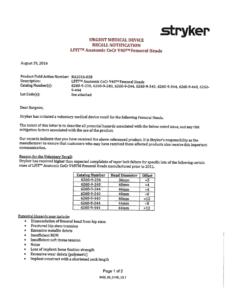Stryker Hip Recall Letters and Metal Blood Testing
The hip replacement lawyers at Saiontz & Kirk, P.A. are continuing to review potential cases for individuals nationwide who have been notified that they received a recalled Stryker L-Fit V40 femoral head, or who have undergone metal blood testing and suspect that they may have received the unreasonably dangerous and defective component.
Many individuals with an artificial hip implant are now receiving Stryker hip recall letters or notices from their doctors recommending that they undergo metal blood testing, due to a higher-than-expected rate of problems with certain components used during their original surgery, which may cause:
- Dislocation of the Femoral Stem from the Hip Stem
- Fractured Hip Stem Trunnions
- Excessive Metallic Debris
- Limited Range of Motion or Soft Tissue Tension
- Noise or Sound from the Hip Replacement
- Other Hip Replacement Failure
Free case evaluations are provided by the attorneys at Saiontz & Kirk, P.A., as financial compensation may be available for individuals who received a Stryker LFIT V40 femoral head. It is not necessary to know the exact components used during your hip replacement surgery.
CONTACT OUR HIP RECALL LAWYERS
Stryker LFIT V40 Femoral Head Recall Notice
On August 29, Stryker sent out a “Dear Surgeon” letter (PDF) to medical professionals worldwide, notifying them of a recall impacting specific lots and sizes of the LFIT Anatomic CoCr V40TM femoral heads manufactured prior to 2011.
 In the Stryker hip recall letter, the manufacturer acknowledged that it has received a higher than expected number of complaints of taper lock failure, meaning the femoral head became detached from the hip stem.
In the Stryker hip recall letter, the manufacturer acknowledged that it has received a higher than expected number of complaints of taper lock failure, meaning the femoral head became detached from the hip stem.
These incidents have been linked to high levels of corrosion that may be caused by metallic debris released by the chromium and cobalt femoral hip head.
The letter fails to sufficiently warn doctors or their patients that the corrosion released from the recalled LFIT femoral heads could shed into the surrounding tissue, causing metallosis; a condition that is far more dangerous and linked to many more complications and health risks than the letter indicates.
In cases of metallosis, the metal ions released from a hip replacement system can cause a reaction around the joint, deteriorating the tissue and loosening the hip components. The debris can also cause other health problems, potentially impacting the nervous system, heart and thyroid glands.
Some common symptoms of hip replacement metal poisoning may include:
- Hip or Groin Pain
- Difficulty Walking or Standing
- Inflammation or Swelling
- Loosening or Failure of the Metal Hip Replacement
- Development of Tumors
While the Stryker recall notice warned about the risk of inflammatory responses, the potential need for revision surgery, dislocation, adverse local tissue reactions and periprosthetic failure, it failed to notify doctors as to the cause of these complications and the risks of metallosis.
Despite the inadequate warnings provided by Stryker about the problem, many doctors are recommending patients undergo a blood test to determine if they were suffering from elevated levels of cobalt, chromium or titanium, which would have been a sign of Stryker LFIT V40 femoral head corrosion.
Stryker LFIT V40 Hip Recall Lawsuits
Financial compensation and hip settlements may be available for individuals who have:
- Received a Stryker hip recall notice
- Required Metal Blood Testing; or
- Undergone Revision Surgery for a Stryker Hip Replacement
Potential injury cases and Stryker hip recall class action lawsuits are pursued by the lawyers at Saiontz & Kirk, P.A. under a contingency fee agreement, which means that there are no out-of-pocket costs to hire our law firm and we only an attorney fee or reimbursed expenses if we are successful obtaining a recovery for you or your family.


1 Comment • Add Your Comments
Robert says:
I had hip revision surgery due to cobalt poisoning and heart problems. Never received a recall letter.
Posted on February 8, 2024 at 5:54 pm